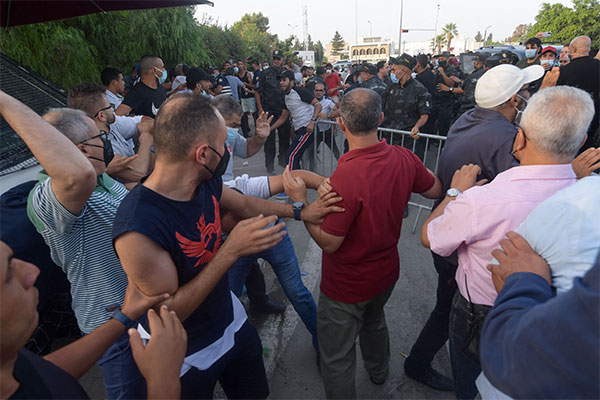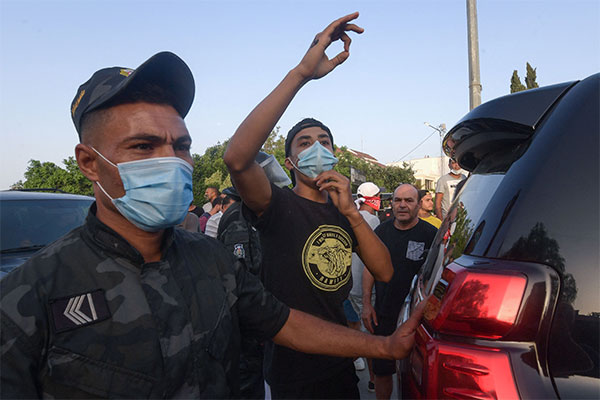Police intervened Monday to prevent clashes outside the parliament building between lawmakers from Islamist party Ennahdha, which dominates the Assembly of the Representatives of the People of Tunisia, and demonstrators supporting President Kais Saeid.
Both sides shouted and some stones were thrown, according to an Associated Press reporter and videos circulating online.
The clashes outside parliament come a day after President Saied ousted the prime minister and suspended the legislature.
On Sunday, Saied sacked Prime Minister Hichem Mechichi and ordered parliament closed for 30 days, a move the biggest political party Ennahdha decried as a "coup", following a day of angry nationwide street protests against the government's handling of the Covid pandemic.
To date, 7% of the population has been fully vaccinated, while more than 90% of the country's ICU beds are occupied, according to health ministry figures.

Clashes erupt between supporters of Tunisian President Kais Saied and Annahda party deputies in front of the Parliament which was cordoned-off by the military in the capital Tunis on July 26, 2021. AFP
Videos have circulated on social media showing dead bodies left in the middle of wards as morgues struggle to deal with growing deaths.
Late Sunday night, protesters celebrated President Kais Saied's decision, shouting with joy, honking horns and waving Tunisian flags.
But his critics accused him of a "power grab" that threatens Tunisia's young democracy.
Chief among them was the head of the Islamist Ennahda Party and parliament speaker Rashed Ghannouchi, who called it ``a coup against the constitution and the (Arab Spring) revolution.''
Ennahdha has been a particular target, accused of focusing on its internal concerns instead of managing the virus.
Security forces also moved in Monday on the Tunis offices of Al Jazeera, according to a statement by the Qatar-based network on its Facebook page. The reason for the move was not immediately clear.
Al-Jazeera, citing its journalists, said 10 ``heavily armed police officers'' entered their bureau without a warrant and asked everyone to leave. ``The reporters' phones and other equipment were confiscated, and they were not allowed back into the building to retrieve their personal belongs,'' the organization said.
Qatar and its Al-Jazeera satellite news network has been viewed by some Mideast nations as promoting Islamist groups like the Muslim Brotherhood.
In a written statement, EU Commission spokesperson Nabila Massrali said Monday, “We call on all Tunisian actors to respect the Constitution, its institutions and the rule of law. We also call on them to remain calm and to avoid any resort to violence in order to preserve the stability of the country.”
Earlier on Sunday, thousands of people defied virus restrictions and scorching heat to demonstrate Sunday in the capital, Tunis, and other cities.
The largely young crowds shouted ``Get out!'' and slogans calling for the dissolution of parliament and early elections. Clashes erupted in many places.
Tunisia's economy has been struggling for years, and the country recently reimposed lockdowns and other virus restrictions because it's facing one of Africa's worst virus outbreaks.
After the announcement of the president's decision, army units were deployed around the capital, and an Associated Press reporter saw military vehicles heading toward the parliament in nearby Bardo.
Soldiers from early Monday blockaded the assembly in Tunis and barred entry to the parliament speaker.

Security officers intervene amid clashes between supporters of Tunisian President Kais Saied and Annahda party deputies in front of the Parliament which was cordoned-off in the capital Tunis on July 26, 2021. AFP
During the night, Ghannouchi tried to enter with an associate but was blocked, according to Mosaique FM news radio. He insisted the parliament would continue to work despite the president's move and staged a sit-in outside the legislature to protest being barred from entry.
The president cited concerns about violence as a reason for his decision, and warned against any breach of public order, threatening troublemakers with severe penalties. ``We have taken these decisions ... until social peace returns to Tunisia and until we save the state,'' he said in a televised address.
He invoked an article of Tunisia's constitution allowing him to take ``exceptional measures in the event of imminent danger threatening the institutions of the nation and the independence of the country and hindering the regular functioning of the public powers.''
The measure allows him to assume executive power and freeze parliament for an unspecified period of time until normal institutional workings can be restored.
Labour federation calls for clear roadmap
Tunisia’s General Union of Labour (UGTT) called on Monday for the development of a “clear participatory roadmap” and abiding by the constitution after President Kais Saied ousted premier Hichem Mechichi and suspended the legislature on Sunday.
The UGTT — one out of four Tunisian institutions that received a Nobel Peace Prize in 2015 for brokering a post-revolution transitional deal between political forces — said it wants the roadmap to outline “goals, means, and a calendar, reassuring the people and dispelling fears.”
In a statement published on its website, the powerful labour organisation saluted the military and urged all parties to keep it far from “political quarrels.”
This is based on the UGTT’s belief in the military institution's “nobility, patriotism, and unconditional adherence to the protection of the country and people and preservation of the civil state.”
The statement emphasised the need for reviewing the measures related to the judiciary to ensure its independence
World reactions
Foreign governments voiced concern and caution. Here are some reactions from countries around the world to Sunday's shock announcement.
Germany
A spokeswoman for the foreign ministry, Maria Adebahr, told reporters that Germany hoped Tunisia would return "as soon as possible to constitutional order".
"Democracy has taken roots in Tunisia since 2011", Adebahr said, referring to the year of the popular revolution that toppled dictator Zine El Abidine Ben Ali.
Germany was "very worried" she said, adding however: "We don't want to speak of a coup d'etat".
"It is important to return to constitutional order as quickly as possible," Adebahr said.
"We will certainly try to discuss (the situation) with the Tunisian ambassador in Berlin, and our ambassador in Tunis is ready to engage in discussions."
Russia
Kremlin spokesman Dmitri Peskov, in brief comments, said Russia was monitoring developments in Tunisia.
"We hope that nothing will threaten the stability and security of the people of that country," he told reporters at a daily phone briefing.
Turkey
The foreign ministry said it was "deeply concerned" by the latest development in Tunisia and called for the restoration of "democratic legitimacy".
"The preservation of Tunisia's democratic achievements, which is a success story in terms of the democratic process conducted in line with the expectations of people in the region, is of great importance for the region as well as for Tunisia," the ministry said.
President Recep Tayyip Erdogan's spokesman, Ibrahim Kalin, tweeted: "We reject the suspension of the democratic process and the disregard of the people's democratic will in friendly and brotherly Tunisia.
"We condemn initiatives that lack constitutional legitimacy and public support. We believe Tunisia democracy will emerge stronger from this process."
European Union
In a written statement, EU Commission spokesperson Nabila Massrali said Monday, “We call on all Tunisian actors to respect the Constitution, its institutions and the rule of law. We also call on them to remain calm and to avoid any resort to violence in order to preserve the stability of the country.”
Qatar
Qatar called on Tunisia’s political forces to “prioritise the interests of the people, follow the voice of wisdom, and avoid escalation and its implications on Tunisia’s experience that earned regional and international respect.”
In a statement published by its foreign ministry, Doha said it is closely following the developments in the North African state.
“Qatar hopes that the Tunisian parties would choose dialogue to overcome the crisis, consolidate the foundations of its institutions, and establish the rule of law,” the statement added.
*This story was compiled by Ahram Online.
Short link: